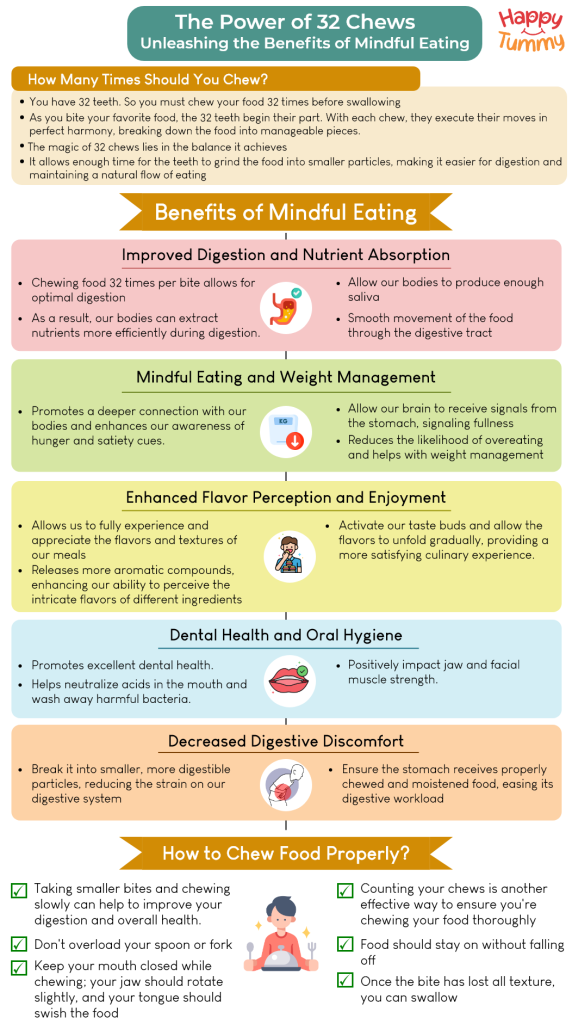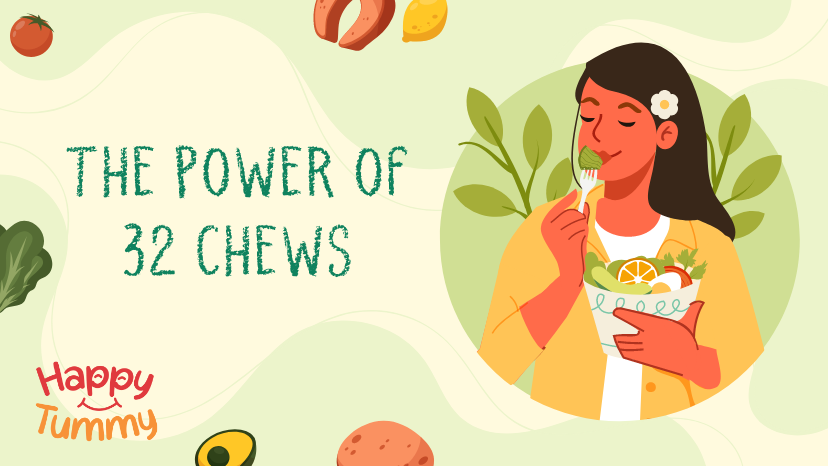Table of Contents
Growing up, we frequently heard not just gulp your food or eat slowly. Also, our mother has often urged us to chew our meals properly. Well, whatever they said about, chewing food makes sense now and forever!
Chewing your food well before swallowing it is beyond necessary. However, do we actually use our whites enough?
And most importantly, how many times should we chew our food? It’s a question that most of us are unlikely to have an answer to. So please scroll down to read everything you need to know about chewing and explore its advantages to our bodies and minds.
How Many Times Should You Chew?
Well, the answer to it lies within. But, you might wonder, how? You have 32 teeth. So you must chew your food 32 times before swallowing.
However, have you ever considered the intriguing connection between the number of teeth in your mouth and the recommended 32 chews per bite?
Some believe it to be a fantastical tale, while others assert it is merely one of the many food-related stories. Is it necessary to chew food 32 times, one for each tooth?
This quote sustains even today, leaving countless people baffled. Fear not; we’re here to delve deep and find the scientific truth.
The process of chewing is also known as mastication. When you consume food, you break down food pieces into smaller particles through mastication. Saliva is mixed with these tiny food particles, and the resultant mixture is passed to the stomach for further processing. Thus, the mouth acts as the primary initiator of this digestion process.
As you bite your favorite food, the 32 teeth begin their part. With each chew, they execute their moves in perfect harmony, breaking down the food into manageable pieces.
The magic of 32 chews lies in the balance it achieves. It allows enough time for the teeth to grind the food into smaller particles, making it easier for digestion and maintaining a natural flow of eating.
You might not realize it, but chewing your food 32 times brings impressive health benefits to our body and mind.

1. Improved Digestion and Nutrient Absorption
Chewing food 32 times per bite allows for optimal digestion. In addition, by thoroughly breaking down food into smaller particles, we increase its surface area, enabling digestive enzymes in our saliva to initiate the breakdown of carbohydrates, proteins, and fats.
As a result, our bodies can extract nutrients more efficiently during digestion.
Furthermore, when we chew our food an adequate number of times, we allow our bodies to produce enough saliva [1]. This saliva contains enzymes that aid digestion and ensures the food is adequately moistened, facilitating the smooth movement of the food through the digestive tract.
2. Mindful Eating and Weight Management
Practicing mindful eating by chewing food 32 times per bite promotes a deeper connection with our bodies and enhances our awareness of hunger and satiety cues.
Further, by taking the time to chew our food mindfully, we allow our brain to receive signals from the stomach, signaling fullness. This reduces the likelihood of overeating and helps with weight management [2].
3. Enhanced Flavor Perception and Enjoyment
Chewing our food 32 times per bite allows us to fully experience and appreciate the flavors and textures of our meals.
By taking the time to chew mindfully, we activate our taste buds and allow the flavors to unfold gradually, providing a more satisfying culinary experience.
Additionally, thoroughly chewing our food releases more aromatic compounds, enhancing our ability to perceive the intricate flavors of different ingredients [3].
This heightened sensory experience makes eating more pleasurable and encourages us to be more mindful of the quality and composition of our foods.
4. Dental Health and Oral Hygiene
Practicing 32 chews per bite promotes excellent dental health. Thorough chewing stimulates saliva production, which helps neutralize acids in the mouth and wash away harmful bacteria.
Saliva also contains minerals that aid in remineralizing tooth enamel (natural tooth repair process), protecting against tooth decay and cavities.
Chewing food well can also positively impact jaw and facial muscle strength. By engaging these muscles through proper chewing, we exercise them, promoting their functionality and overall oral health [4].
5. Decreased Digestive Discomfort
When we chew our food thoroughly, we break it into smaller, more digestible particles, reducing the strain on our digestive system.
However, larger food particles can lead to digestive discomfort, such as bloating, gas, and indigestion.
By taking the time to chew our food adequately, we ensure the stomach receives properly chewed and moistened food, easing its digestive workload [5].
This can lead to a reduction in common digestive issues and promote overall digestive comfort.
How to Chew Food Properly?
We all chew our food, but do we do it properly? Taking smaller bites and chewing slowly can help to improve your digestion and overall health. Don’t overload your spoon or fork.
Food should stay on without falling off. Keep your mouth closed while chewing; your jaw should rotate slightly, and your tongue should swish the food.
Counting your chews is another effective way to ensure you’re chewing your food thoroughly. Once the bite has lost all texture, you can swallow.
Long story short, chewing your food 32 times may sound tedious, but it’s worth it. It helps with digestion, prevents overeating, unlocks nutrients, improves gut health, and reduces the risk of choking.
So take it slow, enjoy your food, and make chewing a habit. Ready -1-2-3——32.
Frequently Asked Questions
While there is no universally agreed-upon number, chewing food 32 times per bite is often recommended to ensure the thorough breakdown of food particles, the release of saliva and digestive enzymes, and optimal digestion.
Chewing food thoroughly, including 32 chews per bite, can contribute to weight loss by promoting mindful eating. In addition, it reduces the likelihood of overeating and aids in weight management goals.
Poor digestion, reduced nutrient absorption, weight gain, poor dental health, and digestive discomfort are some of the ill effects of not chewing food properly.















